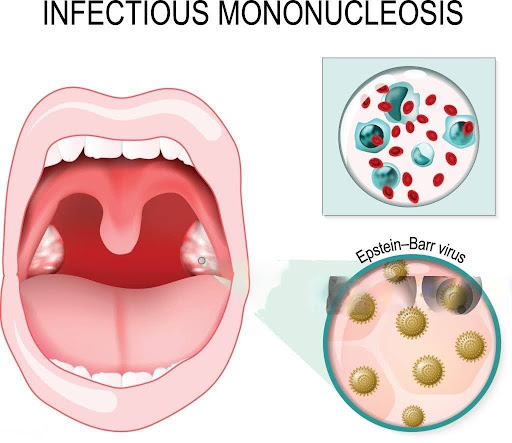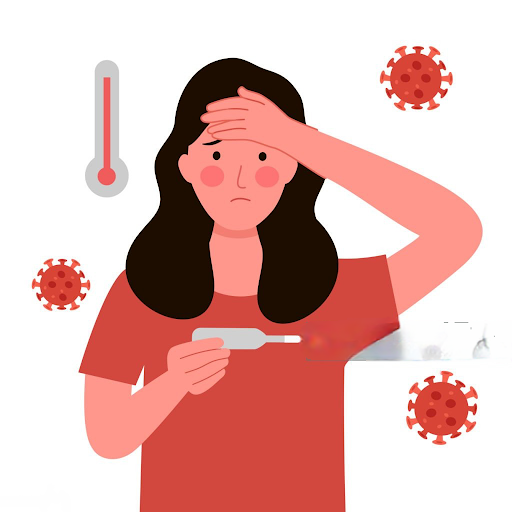Unmasking Mononucleosis: The Sneaky Invader of Your Energy
Monoclueosis often called mono is a viral infection caused by the Epstein-Barr virus (EBV). This virus is primarily transmitted through saliva from the mouth of an infected person earning the nickname “the kissing disease”. It may also spread through vaginal or cervical secretions during sexual contact.
However, you do not have to swap spit left and right to catch it. One might get infected if they share the same utensils, food, or drinks. It is crucial to understand that not every case of mononucleosis is an STI.
Many individuals encounter the Epstein-Barr Virus during childhood often without realising it. For teenagers and adults who haven’t been exposed earlier, contact with an infected person’s saliva is a common means of exposure
Once exposed the virus stays in their body for life remaining dormant or inactive- a condition known as “viral latency’’. Even without symptoms, people can unknowingly transmit the infection to others through intermittent shedding of the virus in their saliva.

What are the symptoms of Mononucleosis?
Mono is like a chameleon, it can disguise itself as many common ailments, making it a bit of a puzzle. Are there any symptoms that one should look for? Symptoms of mono usually appear four to six weeks after you get infected. Here are some symptoms you should not ignore
Extreme Fatigue
If you find yourself battling an overwhelming sense of fatigue that just won’t budge, mononucleosis might be the culprit. This exhaustion goes beyond what you would normally experience, often making simple tasks feel like pushing a boulder up the mountain.
Sore throat
A persistent, severe sore throat is a sign of mononucleosis. It’s nothing like the sore throat that you experience when you get the flu. It’s a much deeper and more persistent discomfort that can linger for weeks.
Swollen Glands
Mono has a knack for causing glands, particularly in the neck and the armpits to swell. These swollen nodes indicate that your immune system is working overtime to combat the viral invasion.
Fever and the Chills
A sudden onset of fever and Chills is another signal that mono has made its way to your system. Keep an eye on your body temperature as it fluctuates during infection.
Headaches and Bodyaches
Mono doesn’t discriminate, it can leave you with pounding headaches and widespread body aches. If your usual pain relievers fail to work, it might be time to consider the possibility of mono.
Skin Rash
In some cases, mono can bring along a skin rash. It’s not a universal symptom though.
Loss of Appetite
Mono often steals your appetite, making even your favourite meals less appealing.

Road to recovery
While there is no magic cure for this common illness, there are several effective methods to manage the symptoms and aid the recovery process. Here are some steps that you can take that will aid you in your recovery journey
Rest, Rest, Rest
Taking rest plays an integral role in the treatment of mono. The fatigue associated with mono is often intense and pushing yourself too hard can prolong recovery. Embrace the opportunity to catch up sleep, relax, and let your body do the healing it needs.
Hydration and Nutrition
Staying hydrated is a must for recovering from mono. Mono can leave you feeling very dehydrated so you must keep drinking water to keep yourself hydrated. Drinking plenty of fluids helps alleviate symptoms of fever and sore throat. A balanced diet will provide essential nutrients to support your immune system. Consider incorporating immune-boosting foods like fruits, vegetables, and lean proteins into your meals. Your body needs it.
Over-the-counter medications
Over-the-counter medications help in relieving certain symptoms such as fever and body aches. However, consulting with a healthcare professional before using any medication is crucial.
Monitoring complications
While most of the cases of mono resolve on their own with time and rest, it is essential to monitor potential complications. If symptoms persist or worsen over time then one should seek medical attention promptly
CONCLUSION
In a journey towards recovery from mono, patience and self-care play pivotal roles. By embracing rest, staying hydrated, maintaining a balanced diet, and consulting with healthcare professionals you can navigate through this period with resilience. It’s important to understand that each person’s experience is unique with mono, so listen to your body and give it the care it deserves.
Author

